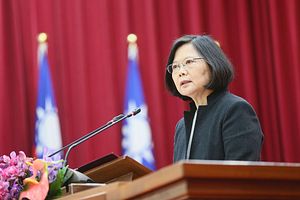On January 2, Xi Jinping, president of the People’s Republic of China (PRC), made a high-profile speech specifically on Taiwan policy at Beijing’s Great Hall of the People.
Xi said that cross-strait reunification is “an irresistible trend” and Taiwan “must and will be” reunited with mainland China. He argued that the “one country, two systems” framework — the policy carried out in Hong Kong and Macao for over two decades — is the best approach for reunification with Taiwan. He also proposed dialogue with political parties and other groups within Taiwan as long as these entities reject Taiwan independence and embrace the “1992 consensus.”
As soon as Xi’s speech was published, Tsai Ing-wen, president of the Republic of China (Taiwan), also made a public speech in front of cameras, firmly rejecting Xi’s proposal. She said:
As president of the Republic of China, I must solemnly emphasize that we have never accepted the “1992 Consensus.” The fundamental reason is because the Beijing authorities’ definition of the “1992 Consensus” is “one China” and “one country, two systems.” The speech delivered by China’s leader today has confirmed our misgivings. Here, I want to reiterate that Taiwan absolutely will not accept “one country, two systems.” The vast majority of public opinion in Taiwan is also resolutely opposed to “one country, two systems,” and this opposition is also a “Taiwan consensus.”
According to the 1992 Consensus, as long as both Beijing and Taipei acknowledge that “there is only one China and Taiwan is part of China” — whether “China” means the ROC or the PRC — the “status quo” between the two sides of the strait could be maintained. Over the years, Beijing has been focusing on the idea of “one China,” while Taipei hedges on the interpretation of “one China.”
Since Tsai came into office in May 2016, cross-strait relations have been going downhill dramatically. Beijing has consistently increased pressure on Tsai’s administration solely for her refusal to publicly embrace the 1992 Consensus.
Now, Beijing is surrounded by multiple challenges and potential crisis: The economy is slowing down; many private companies are closing down; the relationship with the United States is deteriorating; and the conflict between different classes within the nation is growing.
Against that backdrop, what Beijing needs most is to divert local people’s attention as well as anger and anxiety away from those domestic problems and toward some other distant issues. The cross-strait relationship is the best subject: it can quiet opponents’ voices, stir the nationalists’ passion, and help the top authorities consolidate the power.
Tsai’s latest resolute and public rejection of the 1992 Consensus gave Beijing the perfect excuse to enhance its squeeze on Taipei and, at the same time, avert attention from domestic issues.
Most importantly, Beijing has numerous measures at hand to up the pressure — further cutting Taipei’s ties with the international community, grabbing away more of Taipei’s remaining allies, and sending more aircraft and warships to surround the island, to name just a few.
On Taipei’s end, Tsai has to face the fact that her administration does not have much leverage to resist Beijing’s pressure now, unfortunately. Other than calling for the help of the international community, particularly the help of the United States, Tsai has few cards to play.
Will the United States defend Taipei against Beijing?
Based on recent developments, it seems that the United States has been already standing on Taipei’s side. For example, U.S. President Donald Trump recently signed the Asia Reassurance Initiative Act (ARIA) into law. The Act calls for stronger official exchanges and military ties between Washington and Taipei as well as other U.S. allies in the Indo-Pacific region.
But the Trump administration is not reliable. Trump’s “America First” policy makes it clear that the interests of the United States are its top priority, while those of allies sometimes can be sacrificed.
Keeping this in mind, Taipei should not put all its eggs in the U.S. basket. Thus, for the sake of pragmatism — which is one of the must-have skills for a politician — it’s better to live along with Beijing rather than offend it publicly.
Mainland China’s former leader Deng Xiaoping’s strategy for diplomacy might be enlightening for Tsai’s administration now: Observe calmly, secure your position, cope with affairs calmly, hide your capacities, bide your time, and maintain a low profile.

































